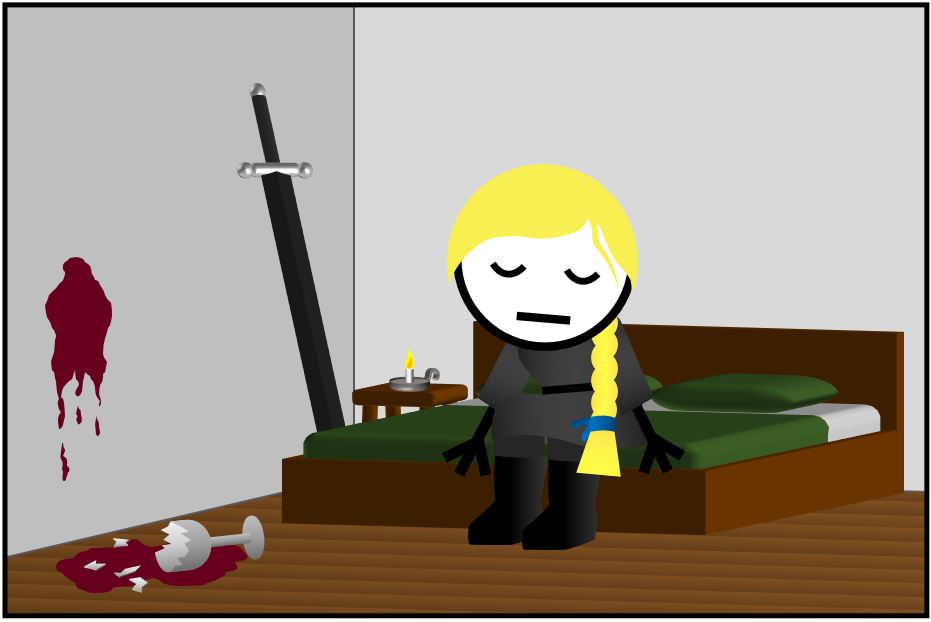I’ve heard about TV shows hiring an actor for a two-bit role that becomes more. Perhaps it is just a line at first, maybe two, but in their brief moment on the screen the actor creates a character that captures the imagination. What was supposed to be a mere instance in time becomes a reoccurring role. For the actor, perhaps, it may be the flashpoint of a stellar career.
Such a thing can occur in writing, too, and Talikae is the proof of it.
**********WARNING! This article includes significant spoilers. I strongly encourage that you only read this if you’ve finished “Tears from Iron.” This article doesn’t give away the heart of the story, but it includes several reveals that may diminish the pleasure of discovery as you make your way through the novel.**********
Talikae enters the pages of the novel as a woman who has been “brainwashed” since childhood in a manner similar to the t’Okaedrin. But she isn’t a warrior. Thus it makes sense that her thoughts and preoccupations would be different. Trying to solidify this differentiation, I decided to make her afraid of the forest. She has always lived in the safety of Nahirazith’s walls. Wouldn’t it make sense for generations of such caged creatures to come up with stories about how dangerous the world is beyond their prison? In this way, Talikae is similar to Fritten, the young man in the smelting camp who doesn’t want his friends to die with the Scions in the wilderness.
But through a coincidental encounter with Ninanna, Talikae’s eyes are opened and she dares to see the world beyond her experience as not just something to be feared. For my immediate purposes, this allowed Ninanna to feel anguish as she realizes Talikae was beaten for daring to speak “absurdities” about wanting to see the forest. Even worse, after Ninanna questions Talikae’s mother, she realizes that both women are truly chained in their own minds. It is a special kind of sorrow when both the punished and punisher live under the same lie.
With that sequence, Talikae’s purpose was complete. She exited “stage left” and was set to vanish and become yet another “Memory” of the Cataclysm. But part of storytelling is efficiency. In TV shows and movies, you may see the same extras pop up multiple times because it costs less for the studio to pay one actor rather than two. This concept happens in books, as well, if for a different reason: name saturation. In large stories, as many fantasy epics so often are, the reader is introduced to a mammoth cast of characters. Despite intentions to the contrary, this can sometimes be challenging for an author to mitigate. But Talikae was one such opportunity.
As the story progresses and Belarrin returns from the Scion camp to the Kayrstaran Empire, he needs to be properly groomed for a meeting with the empress. I could have introduced a new Pi’aernotha Kaupet, but why? Talikae was interesting to write, so I decided to save the reader some mental effort by reuniting them with a familiar face instead of someone new.
But by making this small choice, I moved the story in a new direction. I had made Talikae important. It opened new doors by creating a perfect opportunity for the open-eyed Belarrin to interact with a woman who has begun “awakening” in her own small way. As a result of that short dialogue, she shifted from being important to thematically critical. She is one of the few characters who bridges the character arcs of Belarrin and Ninanna. She is also one of only four characters to personally face the question of believing what she’s been told versus what she’s experienced (the other three being Belarrin, Hirnid, and, briefly, Bridionis). Indeed, she is the only one to see on her own.
In a way, I think of her like Samwise Gamgee from “Lord of the Rings.” I read an observation somewhere that of all the creatures of Middle Earth who became a ring-bearer he is unique. Unlike Isildur, Gollum, Bilbo, and Frodo, he is the only one to give up the fell power of the ring willingly.
Much like the simplicity of Samwise Gamgee, it is the innocence of Talikae that makes her so powerful. Belarrin is not innocent. So far as that goes, neither are the Scions. Both have blood on their hands and anger in their hearts. Talikae is set apart because she is decidedly not a warrior and has no inclinations whatsoever in that direction. She also has what I would call a naïve innocence. This is how she is similar to the aforementioned Fritten. Both are emotionally and intellectually immature. I think this is, for Fritten, because he is young. Talikae is a little older, but her ‘maturity’ is not. But while Fritten is more of a pathetic creature who has grown dependent upon his cage, Talikae has simply never considered anything beyond it. They each take different paths. Fritten remains insignificant while Talikae becomes more. She isn’t about genius, cunning, strength, or power. She is a hard-working kindly woman with simple dreams. She doesn’t have to understand the nuances of the Syraestari-Human conflict. Nor does she have to know the epic glories and sorrows of the Lost Age, the Great War, or the Cataclysm. She is simple goodness and in that goodness, she changes everything.
Next time we’ll look at Talikae’s role in the final act of the tale. We’ll look at the parallel path she follows with Belarrin, if in miniature. We’ll see how her personality forced me to take a second look at the early drafts of the climax and fundamentally change some key points. And finally, we’ll look at her final fate and why it had to turn out that way.
